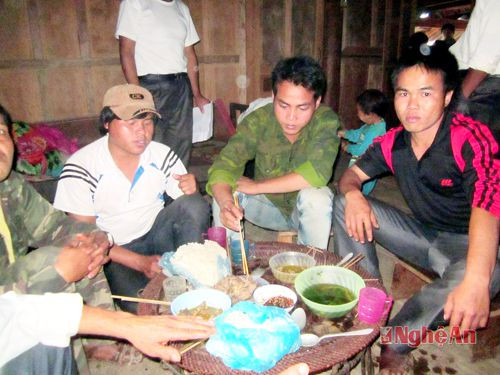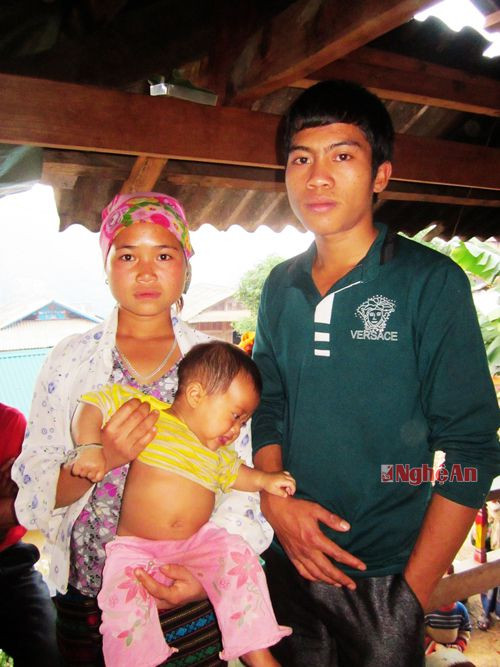The custom of living with the wife's family's family, past and present
(Baonghean) - Before bringing his wife to his home, the man has the obligation to live with his wife's parents for a while, according to the agreement between the two families, to repay the bride's upbringing. This is a rather special feature in the wedding customs of the Thai and Khmu people...
Like many other areas, the Thai and Khmu people in Yen Na (Tuong Duong) live quite close to each other. Because of this, there are similarities in customs and lifestyles, including the custom of living with the wife's family's family, which is still quite common in this remote commune.
Coincidentally, we arrived at Mrs. Lu Thi Xuyen's house in Xop Pu village on an early summer afternoon. This is one of three Khmu villages in Yen Na commune. Everyone in the family was busy, some were stacking firewood in the corner of the house, others were preparing to catch pigs. Another group was busy sweeping the house and alley. When asked, we learned that the family was preparing to marry their son, Moong Van Bua, the next day. The young couple were not at home. They were staying at the bride's house, also a Khmu family in Hoa Binh town, Tuong Duong district. We were quite surprised because the groom should be at home with his family at this time, and tomorrow he would go pick up the bride. Mrs. Xuyen explained that her son was staying at the bride's house. During the wedding, when picking up the bride, they brought the bride and groom home together.
 |
| Wedding meal of the Khmu people. |
Having attended weddings in the Don Phuc commune area, the writer of this article is no stranger to the custom of living with the son-in-law. These Thai areas and the Khmu people in Keng Du (Ky Son) also have that custom and it is also quite an interesting thing in the wedding customs of the Thai and Khmu communities. The highlanders believe that when a daughter is born and grows up, her parents have to work hard to raise her. That effort cannot be exchanged for silver bars, buffaloes, cows or paper money, but the son-in-law, no matter how little or much, must live with the wife's family for a while to help with farming, pigs and chickens; when the village has work to build a house or door, the new groom must also participate. In addition, when living with the son-in-law, the wife's parents will evaluate the son-in-law's character before entrusting their daughter to him. Ms. Lu Thi Xuyen said that any man in Xop Pu village, when getting married, must live with the wife's family for at least 1 year, at most 3 years. This has become a custom and relatives call it living with the wife's parents to repay the favor.
Another person in Xop Pu village, Mr. Oc Dinh Tan, has unforgettable memories of his time living with his wife's family. This 58-year-old veteran said that in 1979 he joined the army. Before leaving for the northern border to fight against the Chinese invaders, he had time to ask his wife and prepare to do his "duty" of living with his wife's family. However, he had to leave due to the situation of the country at that time. After 3 years in the army, Mr. Tan returned to the village and started living with his wife's family, the same amount of time he spent in the army.
Mr. Tan said that during those 3 years, he became a member of his wife's family. Only when his wife's family was free could he come back to help his parents. At that time, the son-in-law had to do any work as requested as well as the daily work of his wife's parents. Not only that, to please his wife's family, the groom had to try harder than usual. In addition, he also helped other families in the family with tasks such as building houses, clearing fields, or when there were weddings, roofing, funerals...
 |
| Young couple's family in Keng Du - Ky Son. |
“To please my wife’s parents, I had to wake up before the whole family to cook sticky rice, feed the chickens and pigs. After breakfast, I had to take a knife and go clear the fields before the whole family,” Mr. Tan recalled. At that time, Mr. Tan’s wife’s family also had many children. She was the eldest child, and when he married her, she was only 17 years old. After her, there were 8 younger siblings, all of whom were very naughty. Seeing that the family had a brother-in-law, everyone competed to sleep together, demanding that he serve rice, and whining about all sorts of things. One wanted to weave a basket, another wanted to peel a spinning top, and one even carried a baby, because when he became a son-in-law, his mother-in-law gave birth to 3 more children. So Mr. Tan had to take care of his younger siblings and also take care of his mother-in-law giving birth. During those 3 years, he helped his father-in-law cut wood and build a stilt house, which was normal for sons-in-law in the village in the 80s of the last century.
Mr. Tan himself had to live as a son-in-law for so long because his family did not have a buffalo or silver ingots to pay the bride's family. In the past, the dowry was very heavy, usually requiring a buffalo and silver ingots to get a wife. This caused many poor men to have to make the trade-off by living as a son-in-law for a long time. Some people with more difficult circumstances had to live as a son-in-law for up to 5 years and the wife's family would build a house for them to live in. As for families with enough money to pay the dowry and both families sympathized with each other, the son-in-law usually only had to do his "duty" at the wife's family for 6 months to 1 year. After that, an official wedding was held and the son-in-law took his wife to his house.
Another Xop Pu village resident, Mr. Oc Van Loi (31 years old), said that nowadays in the village, the custom of living with the wife's parents for 3 years is almost gone. The longest is only 1 year. According to Mr. Loi, this custom of living with the wife's parents is reasonable because "if we take away someone's daughter without returning the favor, it would be a great loss for them." As for the Khmu communities along National Highway 7A such as Pa, Na Luong, Huoi Tho (Huu Kiem - Ky Son) the custom of living with the wife's parents to repay the favor is almost gone. Mr. Kha Van Quyen, Chairman of the People's Committee of Huu Kiem commune, said: Now in the Khmu village, no one lives with the wife's parents anymore, people have followed the modern trend.
However, the Thai community in Cam Lam and Don Phuc still maintains this custom. Lo Van Hung, a resident of Bach Son village (Cam Lam - Con Cuong), got married 2 years ago. Before the official wedding, Hung had to move to Hong Dien village, Don Phuc commune to live with his wife's family for 9 months. Hung said that living with his wife's family is very easy, just for the bride's family and the groom's family to get to know each other. Now no one cares about whether the son-in-law is diligent or lazy anymore.
Xieng Nua village is also a Thai community in Yen Na commune (Tuong Duong) that still maintains the custom of living with the wife's family. In just about 2 weeks, Luong Thien Dinh will hold a wedding with a girl from Vang Cuom village (Yen Tinh commune - Tuong Duong). Dinh only has to live with the wife's family for 3 months. "It's just to follow the custom," the 21-year-old man said. Lo Van Pan, from Na Pu village (Yen Na), who got married in 2013, said he didn't have to live with the wife's family for a single day because the girl's family didn't ask. Nowadays, when boys in the village get married, they rarely have to live with the wife's family because people no longer have to carry the old concepts. "Nowadays, when young men in the village get married, they are working in companies, studying or working as officials, so where do they have time to live with the wife's family?" Pan said. Perhaps because of such changes in the highland community, the custom of living with the wife's family's family is increasingly fading away?
You Wei






